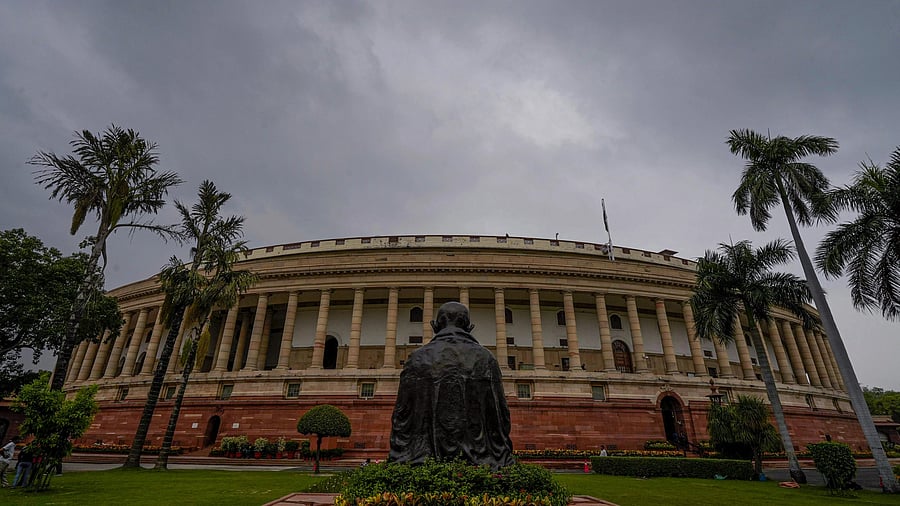
Monsoon clouds over the Parliament building during ongoing Monsoon, in New Delhi
Credit: PTI Photo
Reports of the so-called ‘death’ of parliament may no longer be exaggerated. PRS Legislative Research estimates that the 17th Lok Sabha could record the lowest number of sitting days since 1952. The 2023 Budget Session saw the lowest productivity in five years. The 17th Lok Sabha has seen the fewest debates, the maximum adjournments, and the least number of bills sent to parliamentary committees.
Which is why Tuesday’s No-Confidence motion is being highly anticipated. Not because the survival of the Narendra Modi-led government is in any doubt, but because at least there may be some fiery debate in the House. Parliament’s record was not always dismal: in over 70 years of existence, India’s parliamentarians have often brilliantly and courageously upheld the best practices of parliamentary democracy. A suggested list of India’s 10 best parliamentarians:
1. India’s pre-eminent freedom fighter and first Prime Minister, Jawaharlal Nehru. Nehru respected parliament so greatly that he not only attended punctually and sat through Question Hour regularly, but even had a microphone installed in his office to listen to the debates when he could not be physically present in parliament.
In November 1962, on the demand of the Opposition, Nehru convened a special session of parliament to debate the ongoing 1962 India-China war. In another context, Nehru’s statement: “Even a member of my own party must be suspended for conduct unbecoming of a member,” was appreciatively quoted by BJP leader Arun Jaitley in 2006. Nehruvian parliamentary democracy allowed Opposition leaders like Shyama Prasad Mukerjee and Atal Bihari Vajpayee to shine.
2. Atal Bihari Vajpayee. Vajpayee was a politician made in parliament, the perpetual MP, almost continuously in parliament from 1957 to 2009. Vajpayee’s bureaucrats often despaired that the PM preferred parliament to his office. Vajpayee’s 1996 speech after the fall of his 13-day government is regarded as one of the best speeches ever in parliament.
3. Socialist leaders N G Gore, Barrister Nath Pai and Madhu Limaye dominated parliament, but amidst them, George Fernandes blazed like a meteor. Fernandes delivered forceful speeches against Morarji Desai, called Indira Gandhi a “congenital liar,” and defended himself lengthily in parliament on allegations by Tehelka.com and on the “Coffin-gate” accusations.
4. Ram Manohar Lohia dubbed Indira Gandhi a “goongi gudiya,” in parliament. Lohia’s arguments in the 'Three annas versus fifteen annas' debate made great impact. Lohia asserted that the government’s view that the average daily income of a person was 15 annas was false and proved through figures that the average income of a person was just three and a half annas or four annas per day.
5. The Left produced great parliamentary performers like Bhupesh Gupta, Indrajit Gupta, and Somnath Chatterjee. Among them, the Oxford-educated Hiren Mukherjee was the stand-out figure. Mukherjee was Nehru’s favourite parliamentarian and Vajpayee’s friend and referred to the latter as “My dear Atal.” Mukherjee usually spoke masterly English but once, in a famous Lok Sabha moment, held the House spellbound by speaking in perfect Sanskrit for 25 minutes.
6. Feroze Gandhi, the least talked-about Gandhi took his father-in-law’s government repeatedly to task and forced the resignation of Nehru’s Finance Minister T T Krishnamachari and led an attack on Nehru’s aide M O Mathai in the House.
7. Piloo Mody, the witty parliamentarian was known for his sardonic humour. When chided for turning his back to the Speaker, the rotund Mody responded: “Sir, I have neither front nor back, I am round.” In the early 1970s, when Indira Gandhi became known for accusing detractors of being ‘foreign agents,’ Mody arrived in parliament wearing a placard: ‘I am a CIA agent.’
8. Sushma Swaraj redefined the role of the woman parliamentarian with well-informed, powerful speeches, delivered in flawless Hindi. She remains the only female MP to be awarded the Outstanding Parliamentarian award. “Pranab da, reforms,” she said in Parliament in 2011 to then Finance Minister Pranab Mukherjee, “are those that help people, not those that help our image in America.” Sushma Swaraj shone in parliament without ever abusing or jeering someone, and she is an example to certain women ministers these days who believe that loud heckling is the way to make a mark in the House.
9. Articulate lawyer-parliamentarians have made noteworthy speeches. Outstanding among them was Arun Jaitley, whose speech in the 2006 Office of Profit debate is remembered: “There have been periods in history where we have legislated because the movers of legislation have enjoyed a majority, but those instances have never been considered glorious for parliament,” said Jaitley.
10. Former President Pranab Mukherjee had phenomenal knowledge of constitutional and parliamentary procedures. Pleading for consensus, he argued: “The accident of seating in parliament must not stand in the way of nation-building.”
Today’s parliamentarians are missing from this list only because there has been little opportunity to hear them. Vajpayee as an Opposition leader was allowed full rein, but today not only are Opposition leaders not allowed many opportunities to speak, but even when they are allowed, there are accusations that their microphones are switched off. Last month, Leader of the Opposition in the Rajya Sabha and Congress President Mallikarjun Kharge charged that while he was speaking, his mike was switched off. “This is an insult to me. My self-respect has been challenged. And if the House is run on the directions of the government, then I will understand that this is not a democracy,” Kharge said.
When the treasury benches themselves disrupt parliament, and the Prime Minister -- himself largely absent from parliament -- stays mostly silent about it, parliamentary democracy gets little chance to breathe, let alone be heard.
(The writer is a senior journalist and commentator based in Delhi)